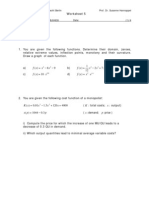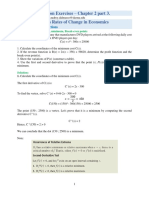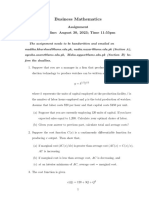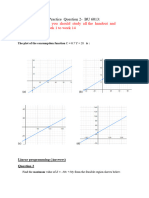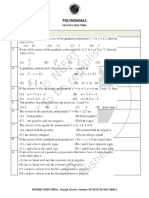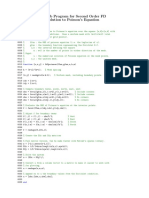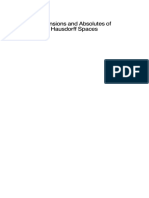0 ratings0% found this document useful (0 votes)
34 viewsChapter 5-Examples & Exercises-1
This document contains an overview of calculus concepts like derivatives and examples of applying derivatives to business problems involving revenue, cost, and profit functions. It includes 7 practice problems finding derivatives of various functions, using derivatives to determine production levels that maximize profit or minimize cost, and calculating marginal revenue, cost, and profit. The document provides solutions to the practice problems to help reinforce understanding of how to apply derivative rules in business contexts.
Uploaded by
hildamezmur9Copyright
© © All Rights Reserved
Available Formats
Download as PDF, TXT or read online on Scribd
0 ratings0% found this document useful (0 votes)
34 viewsChapter 5-Examples & Exercises-1
This document contains an overview of calculus concepts like derivatives and examples of applying derivatives to business problems involving revenue, cost, and profit functions. It includes 7 practice problems finding derivatives of various functions, using derivatives to determine production levels that maximize profit or minimize cost, and calculating marginal revenue, cost, and profit. The document provides solutions to the practice problems to help reinforce understanding of how to apply derivative rules in business contexts.
Uploaded by
hildamezmur9Copyright
© © All Rights Reserved
Available Formats
Download as PDF, TXT or read online on Scribd
You are on page 1/ 4
TBH Mathematics for Management Unity University, Department of Management
Chapter 5: Examples & Exercises
I. Find the derivatives
Derivative Rules
1. Constant rule: If f(x)= k where k is a constant f'(x)=0
f(x)=3, f'(x)=?
2. Linear rule: f(x)=ax+b; f’(x)=a
f(x)=3x+5; f’(x)=?
3. Power rule: f(x)=xn then f'(x)= nxn-1
a) f(x)=x f'(x)= ?
b) f(x)=x25 f'(x)=?
2/3
c) f(x)= ∛(x2) f(x)= x f'(x)= ?
d) The Chain rule (Function power rule): d/dx=[f(x)]n=n[f(x)]n-1f'(x); the derivative
of the outside times the derivative of the inside
f(x)=(2x-7)10 Answer: f’(x)=?
4. Coefficient rule: If f(x) = k.g (x), where k is a constant and g is a differentiable
function. f'(x)=k.g'(x)
f(x)=5x4 f'(x)=?
5. Summation/Difference rule: f(x)= [g(x) + h(x)]; then f'(x)= [g'(x) + h'(x)]
f(x)= 5x4+3x2-2x+7; f'(x)=20x3+6x-2
6. Product rule: If f(x)= g(x).h(x) then f'(x)=g(x).h'(x)+h(x).g'(x); the derivative of
the first times the second plus the first times the derivative of the
second
f(x)=(x+2)(x2+3) f'(x)=?
7. Quotient rule: If f(x)= g(x) then f'(x)= h(x).g'(x)-g(x).h'(x)
h(x) [h(x)]2
denominator times the derivative of the numerator minus numerator times the
derivative of the denominator all divided by the square of the denominator
Example: f(x)=x2-1/1+x2 = f'(x)=?
II. The demand equation for a certain product is p = 6−1/2*x dollars.
TBH Mathematics for Management Unity University, Department of Management
Find the level of production that results in maximum revenue.
Check whether the critical value occurs at the maximum or minimum point
III. A company manufactures and sales x units of transistor radios per week. If the
weekly cost and demand equations are:
(Cost) C(x)= 5000+2x and (Price) p= 10-x/1000; x (quantity)
given constraint [0≤x≤8000]
Find for each week
1. The production level that leads to maximum revenue and the maximum revenue.
2. The production level that leads to maximum profit and the maximum profit.
3. The production level that leads to minimum cost and the minimum cost.
IV. The weekly cost and revenue functions for x units of chairs produced and sold by a
furniture producer are given as follows respectively.
C(x) = 62x2 + 27,500 and
R(x) = x3 - 12x2 + 40x + 10,
Find each of the following.
Determine the marginal cost, marginal revenue and marginal profit when 50 chairs are
sold and interpret your result. Assume that the company sells exactly what they
produce.
Review Exercise
1. Find the derivative of the following functions
A) y=5
B) y=3x-2
C) y= x2-3x+3
D) y=6x3-x4/4 + x3/3 - 1/x2
E) y=(2x2+3x-1) (1/x -3x+2)
F) y =(2x+3)6
2. Suppose that the demand equation for a monopolist is
p = 100 − .01x and the cost function is C(x) = 50x + 10,000.
TBH Mathematics for Management Unity University, Department of Management
a. Find the value of x that maximizes the profit
b. Determine the corresponding price for this level of production.
c. Determine the corresponding total profit for this level of production.
d. Check whether the critical value occurs at the minimum of maximum point
Answer: a. x*=2500; b. price=$75; c. Pmax.=$52,500
3. A CD manufacturer determines that in order to sell x units of a new CD,
the price per unit, in dollars, must be p(x)=1000-x.
The manufacturer also determines that the total cost of producing x units
is given by C(x)=3000+20x.
a. Find the total revenue function R(x)
b. Find the total profit function P(x)
c. How many units must the company produce and sell in order to maximize
profit?
d. What is the maximum profit?
e. Check whether the critical value occurs at the minimum of maximum point
f. What price per unit must be charged in order to make this maximum profit?
Answer c. x*=490; d. Pmax.=$237,100; e. p=$510
4. An apartment complex has 250 apartments to rent. If they rent x apartments
then their monthly profit, in dollars, is given by, P(x)=−8x2+3200x−80,000
How many apartments should they rent in order to maximize their profit
subject to the constraint 0≤x≤250?
Check the profit generated by the end points of the constraint)& compare
it with the previous result
Check whether the critical value occurs at the minimum of maximum point
Answer: 200 apartments; maximum profit $240,000
5. Suppose the total cost C(X) in thousands of dollars for manufacturing X unit is
given by the function: C(X) = 575 + 25x- X 2 ; 0 < X 50
4
TBH Mathematics for Management Unity University, Department of Management
Required:
a. Find the Marginal cost function (MC) at a production level of X units
b. Find the MC at a production level of 40 unit and interpret the result
c. Find the actual cost of producing the 41st unit and compare this cost with the
result found in question number 2
Answer: b. $5000; c. $4750
6. A company manufactures fuel tanks for automobiles. The
total weekly cost (in dollars) of producing x tanks is given by
a. Find the marginal cost function.
b. Find the marginal cost at a production level of 500 tanks per week and in-
terpret the results.
c. Find the exact cost of producing the 501st item.
Answer: b. $40; At a production level of 500 tanks per week, the total production
costs are increasing at the rate of $40 tank. c. $39.95
7. Given the revenue function in dollars R(x) = −3x3 + 600x2 and the cost function
in dollars: C(x)=357x2+1800x
a. Find the marginal profit at x = 10 units. Interpret the result
b. Find the marginal profit at x = 100 units. Interpret the result
Answer: If production increases by 1 unit a. profit increases by $3300 b. profit
decreases by $750,000
You might also like
- Cost Revenue and Profit Functions (English)No ratings yetCost Revenue and Profit Functions (English)7 pages
- Application of Calculus in Commerce and EconomicsNo ratings yetApplication of Calculus in Commerce and Economics7 pages
- 12TH Business Maths 1ST Revision Model Test 1 QPNo ratings yet12TH Business Maths 1ST Revision Model Test 1 QP6 pages
- Calculus: - The Two Basic Forms of Calculus AreNo ratings yetCalculus: - The Two Basic Forms of Calculus Are19 pages
- Applications of Derivatives in Business and Economics100% (1)Applications of Derivatives in Business and Economics6 pages
- MATH 142-511, 516, 517 Spring 2010 Solutions For The Sample Problems For The FinalNo ratings yetMATH 142-511, 516, 517 Spring 2010 Solutions For The Sample Problems For The Final17 pages
- Name: Okogbo Stephen Abraham Department: Economics REG NO: U20DLEC10032 Course Code: Eco 204 COURSE TITLE: Mathematics For Economists IINo ratings yetName: Okogbo Stephen Abraham Department: Economics REG NO: U20DLEC10032 Course Code: Eco 204 COURSE TITLE: Mathematics For Economists II8 pages
- Factoring and Algebra - A Selection of Classic Mathematical Articles Containing Examples and Exercises on the Subject of Algebra (Mathematics Series)From EverandFactoring and Algebra - A Selection of Classic Mathematical Articles Containing Examples and Exercises on the Subject of Algebra (Mathematics Series)No ratings yet
- International Math Bowl Open Round Practice Test 1No ratings yetInternational Math Bowl Open Round Practice Test 14 pages
- BS 105 - Integral Calculus and Compex Number - NEP Based - Autonomy - Proposed - SyllabusNo ratings yetBS 105 - Integral Calculus and Compex Number - NEP Based - Autonomy - Proposed - Syllabus6 pages
- Relations and Functions - Activity ModuleNo ratings yetRelations and Functions - Activity Module4 pages
- A Study On Domination, Independent Domination and Irredundance in Fuzzy GraphNo ratings yetA Study On Domination, Independent Domination and Irredundance in Fuzzy Graph9 pages
- Matlab Program For Second Order FD Solution To Poisson's Equation100% (1)Matlab Program For Second Order FD Solution To Poisson's Equation3 pages
- Tugas Mata Kuliah Bahasa Inggris MatematikaNo ratings yetTugas Mata Kuliah Bahasa Inggris Matematika7 pages
- 10 Minute (WX) Maxima Tutorial - WXM 1 / 5No ratings yet10 Minute (WX) Maxima Tutorial - WXM 1 / 55 pages
- Chris McMullen - Essential Calculus-Based Physics Study Guide Workbook - The Laws of Motion Copie 3No ratings yetChris McMullen - Essential Calculus-Based Physics Study Guide Workbook - The Laws of Motion Copie 31 page
- Notes Topic 3.12A Equivalent Representations of Trigonometric FunctionsNo ratings yetNotes Topic 3.12A Equivalent Representations of Trigonometric Functions4 pages
- J.R. Porter and R.G. Woods, Extensions and Absolutes of Hausdorff Spaces (Springer, New YorkNo ratings yetJ.R. Porter and R.G. Woods, Extensions and Absolutes of Hausdorff Spaces (Springer, New York12 pages
- Theory and Examples Fifth Edition DurrettNo ratings yetTheory and Examples Fifth Edition Durrett62 pages
- Applications of Derivatives in Business and EconomicsApplications of Derivatives in Business and Economics
- MATH 142-511, 516, 517 Spring 2010 Solutions For The Sample Problems For The FinalMATH 142-511, 516, 517 Spring 2010 Solutions For The Sample Problems For The Final
- Name: Okogbo Stephen Abraham Department: Economics REG NO: U20DLEC10032 Course Code: Eco 204 COURSE TITLE: Mathematics For Economists IIName: Okogbo Stephen Abraham Department: Economics REG NO: U20DLEC10032 Course Code: Eco 204 COURSE TITLE: Mathematics For Economists II
- Factoring and Algebra - A Selection of Classic Mathematical Articles Containing Examples and Exercises on the Subject of Algebra (Mathematics Series)From EverandFactoring and Algebra - A Selection of Classic Mathematical Articles Containing Examples and Exercises on the Subject of Algebra (Mathematics Series)
- International Math Bowl Open Round Practice Test 1International Math Bowl Open Round Practice Test 1
- BS 105 - Integral Calculus and Compex Number - NEP Based - Autonomy - Proposed - SyllabusBS 105 - Integral Calculus and Compex Number - NEP Based - Autonomy - Proposed - Syllabus
- A Study On Domination, Independent Domination and Irredundance in Fuzzy GraphA Study On Domination, Independent Domination and Irredundance in Fuzzy Graph
- Matlab Program For Second Order FD Solution To Poisson's EquationMatlab Program For Second Order FD Solution To Poisson's Equation
- Chris McMullen - Essential Calculus-Based Physics Study Guide Workbook - The Laws of Motion Copie 3Chris McMullen - Essential Calculus-Based Physics Study Guide Workbook - The Laws of Motion Copie 3
- Notes Topic 3.12A Equivalent Representations of Trigonometric FunctionsNotes Topic 3.12A Equivalent Representations of Trigonometric Functions
- J.R. Porter and R.G. Woods, Extensions and Absolutes of Hausdorff Spaces (Springer, New YorkJ.R. Porter and R.G. Woods, Extensions and Absolutes of Hausdorff Spaces (Springer, New York
























